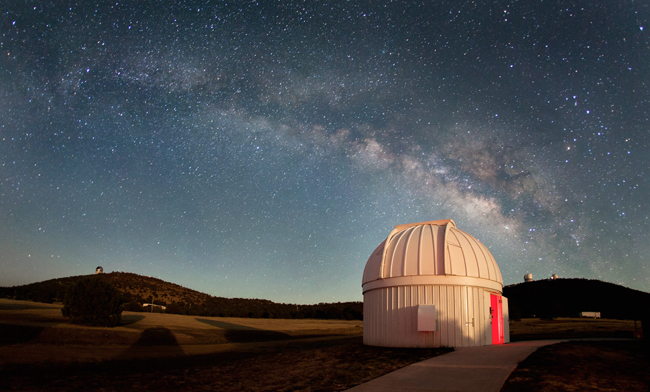UT-Austin involved in creating world’s largest international dark sky reserve
April 21, 2022
The world’s largest international dark sky reserve opened April 7 through a collaboration of entities that focus on environmental concerns and astronomy in West Texas, including UT’s McDonald Observatory.
A dark sky reserve is a “region set aside for astronomy where artificial light pollution is at its lowest,” according to the WorldAtlas website. The new reserve, called the Greater Big Bend International Dark Sky Reserve, stretches over 9 million acres and spans from Fort Davis, Texas to the Chihuahuan Desert, according to the International Dark-Sky Association. Stephen Hummel, dark sky initiative coordinator at the McDonald Observatory, said in addition to its uses in astronomy research, the reserve will protect and support wildlife.
“We’ve been doing dark sky advocacy for a long time,” Hummel said. “Most of that, at least initially, was centered around protecting astronomical research, but over the decades, as the body of science has grown, we’re realizing it’s about so much more than astronomy … light pollution (poses) a threat to our environment.”
Numerous organizations such as the Nature Conservancy, a nonprofit that works to address climate change and biodiversity loss, contributed to the dark sky reserve’s creation. Kaylee French, the West Texas education and outreach coordinator for Nature Conservancy, said the Davis Mountains Preserves, which are located within the reserve, are home to over 200 species of mammals, and 360 species of birds and bats have been recorded there.
“Many of these species rely on dark skies for navigation during migration and foraging,” French said. “A lot of the species in the Chihuahuan desert escape the heat of the middle of the day, so they are only active at night, and a lot of animals are nocturnal … (like) the endangered Mexican long-nosed bat, the bobcat, the mountain lion … all of these rely on dark skies to actually come out and thrive at night.”
In order to maintain the low levels of light pollution, Hummel said there are protections for the night sky with a priority on core areas such as UT’s McDonald Observatory, which is located on the reserve.
“A lot of people come here to visit and see the night sky,” Hummel said. “It’s one of the main tourist draws to the Big Bend region … many cities are completely on board, because if we lose our night sky, we lose a significant contributor to the local economy.”
French said the observatory will hold a festival on the reserve from April 29 to 30 to celebrate its opening, which will include educational programs to spread knowledge on dark skies.
“We hope this is a testament to conservation … across borders,” French said. “Not only bringing together these communities of the area and organizations working within them … but also stressing the importance of working across boundaries together for conservation.”
Hummel said he hopes the reserve will help with protecting dark skies for future generations.
“I hope that we can … at least have a corner of the world where you can go and see the night sky in a natural state,” Hummel said. “But more than that, I hope this is a source of inspiration to others across the world, that international collaboration is possible … we can agree on things and we can get things done. There are solutions to light pollution, and I’m excited that people are taking it seriously and appreciating it.”



